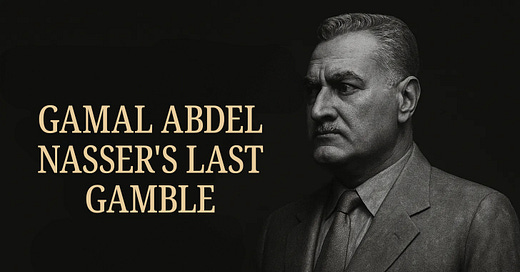Gamal Abdel Nasser's Last Gamble
Inside the private conversation where Egypt’s president confronted the lies, the losses, and an Arab world that wouldn’t fight the war it claimed to want
In the summer of 1970, in a private room behind closed doors, Egypt’s President Gamal Abdel Nasser exploded—not on stage, not into a microphone, and not before a crowd waving flags and chanting slogans.
This was the version of Nasser the public never saw: no grandstanding, no empty promises. Just raw anger, clarity, and exhaustion. A month before his death, he sat down with Muammar Al Qaddafi and a few other leaders and spoke candidly about the impossible situation he was in—the war Egypt couldn’t win, the Arab allies who wouldn’t fight, and the world powers that were playing chess with Egyptian blood.
A rare video clip—now circulating online—captures part of that conversation. It’s a masterclass in geopolitical disillusionment, and a warning still relevant today.
“If we don’t take [the West Bank and Jerusalem] back now,” Nasser told his guests, “they’ll be lost forever.”
He wasn’t being rhetorical. He was speaking as a man who understood just how rapidly Israel moved—and how chronically slow and divided the Arab response had become since the 1967 defeat. It wasn’t just that Israel had better weapons. It had a strategy, international backing, and time. Egypt had none of those things. And Nasser knew it.
Nasser is remembered as the charismatic founder of Arab nationalism, the man who electrified crowds from Cairo to Damascus. But in this room, he sounds less like a revolutionary and more like a realist cracking under the weight of reality.
He had asked the Soviet Union for 300 MiG-21 fighter jets. What he got in return was diplomatic stalling and vague assurances. Moscow wanted to use Egypt as leverage in its Cold War games, but it was never going to go to war with Washington for the sake of Cairo. Meanwhile, the U.S. was fully backing Israel—with weapons, money, and international cover.
In that room, Nasser spells it out: Egypt was alone. Everyone else was just posturing.
“You want war?” he said to his Arab counterparts. “Fine. I’ll give you 50 million pounds. You go liberate Palestine.”
He wasn’t just frustrated—he was furious. While Egyptian soldiers were dying in the “War of Attrition” with Israel, other Arab regimes were holding press conferences and trading in revolutionary slogans. Iraq. Algeria. Syria. South Yemen. He accused them—openly—of using the Palestinian cause as a PR campaign, a branding exercise. None of them, he said, were willing to pay the price.
Nasser understood that wars aren’t won with speeches. In the privacy of this meeting, he tore through the myths of Arab military power.
“They [the Israelis] have converted all their artillery to self-propelled guns,” he said. “We’re still trying to build rocket sites without getting our workers killed.”
He knew the numbers. Egypt was losing 10 soldiers for every Israeli casualty. But he kept the war going, because doing nothing would have been worse. The pain was unbearable, but the alternative—complete surrender—was politically suicidal.
He wasn’t alone in this dilemma. But unlike many of his peers, Nasser refused to lie to himself. That made him dangerous. Even to his own people.
“They’ll say I sold out Palestine,” he told the room. “Maybe someone will try to kill me for this.”
He wasn’t exaggerating. Nasser had already survived one assassination attempt. This time, the death would be slower—brought on by stress, chain smoking, and a heart that couldn’t bear the burden of being the only adult in a room full of children playing war games.
What’s most striking about this moment—frozen in grainy black and white video—is how current it feels. Nasser could have been speaking yesterday.
“The Israelis plan for 25 years,” he said. “We plan for the next headline.”
Fifty years later, that diagnosis still stands. Across the Middle East, governments still rely on televised speeches and symbolic gestures while dodging the hard, slow work of actual strategy. Slogans remain cheap; results remain rare.
What Nasser wanted was modest: a political settlement to claw back some of what had been lost in 1967. He didn’t believe in fairy tales about “liberating all of Palestine.” He knew that was a fantasy. What he sought was a new balance of power, one that could give the Arab world some breathing room—and maybe, one day, a future.
In a region intoxicated by maximalist visions, that made him a traitor in some eyes. But in truth, it made him the only grown-up in the room.
Nasser died just weeks after this conversation. His heart gave out. Not from cowardice or betrayal, but from the sheer weight of leading a fractured region through a war no one else truly wanted to fight.
This video transcript isn’t just a historical artifact. It reminds us that real leadership is not the roar of a crowd, but the quiet agony of choosing what might work over what feels good or is politically expedient. That the real enemy isn’t always on the battlefield—it’s the illusions we refuse to let go of.
And that in the end, even giants can fall—crushed not by their enemies, but by the unbearable loneliness of seeing things clearly.




